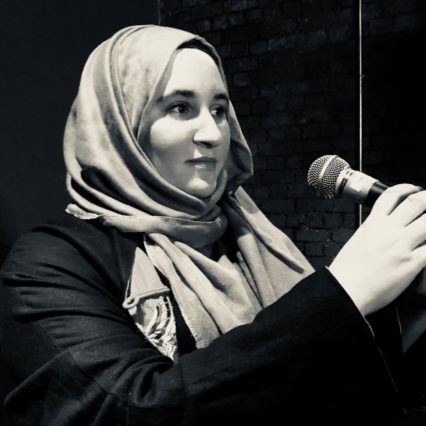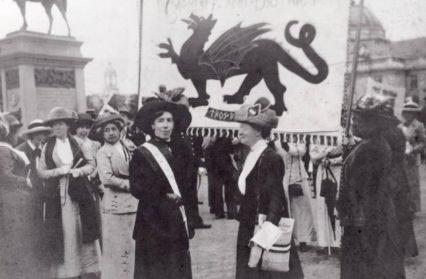In the last in a series of interviews on the first anniversary of the global Women’s March, Cerith Mathias speaks to writer, poet and spoken word artist Hanan Issa about an inclusive feminism, the #MeToo movement, and the work still to be done when it comes to women’s rights in Wales.
You spoke at the Women’s March in Cardiff last year; how are things looking a year later?
I think the most glaringly obvious way in which we have seen progress since last year’s march is in the conversations that are happening. Conversations about sexual assault, about women’s bodies, about equality, what feminism actually means etc.
This, to me, is a step in the right direction. It has been overwhelmingly positive to see women bravely share their stories and speak their truth. It is incredibly moving to see women I admire, like Oprah Winfrey at the Golden Globes, say that we are no longer going to accept the way things are and that things will change because we are invested in that change.
 Speaking of change, what do you make of reports on the all-male Presidents Club Dinner, where women were allegedly harassed and groped? Are you surprised events like this still take place in 2018?
Speaking of change, what do you make of reports on the all-male Presidents Club Dinner, where women were allegedly harassed and groped? Are you surprised events like this still take place in 2018?
To be frank I am not surprised. There’s still so much decolonising needed surrounding the objectification and commodification of women’s bodies and I think we really are at the tip of a very ugly iceberg.
There are some who say it was only ‘harmless fun’ and the backlash has been ‘puritanical’, what does it say about the work still to be done to change attitudes and culture on wider issues of women’s equality?
Not that I agree at all with this sentiment, but I can appreciate where these thoughts are coming from: the snowballing conversation on women’s rights, consent, sexual assault etc. is literally erasing the parameters of what has, up till now, been considered socially acceptable or, at the very least, socially tolerable. People are having to adjust their way of thinking and this can be quite a challenge. It is disheartening to see how some of the victim-blaming comments on this story tread dangerously close to the ‘she was asking for it’ line of argument. This is very telling and really does highlight how essential it is to have these conversations in the public sphere.
It is frustrating; however, that this story has completely overshadowed the incredible example of #MeToo progress witnessed this week. The ruling judge, Rosemary Aquilina, allowed 156 women to give testimonies of sexual abuse against the former Olympic doctor Larry Nassar and sentenced him to 175 years in prison. This, to me, should be the story of focus. A powerful woman using her power to enable voiceless, powerless women to achieve justice against their abuser.
Are there any areas where Wales could be doing better? What more should and could be done to promote women’s rights?
Organisations like WEN Wales require our support to push women’s equality issues further in Wales. But it is equally important for other organisations on the same mission to acknowledge their lack of inclusion or engagement with BAME women. To enforce positive change we need a measure of unity, but it is hard to garner support if certain factions of your target audience feel that their issues are not being addressed or acknowledged.
Personally, I think we have to stop looking at women’s rights as someone else’s fight. It’s true that we need change on a systemic level, but progress also requires discussions in every section of society to help us question and dismantle toxic societal norms that manifest in issues ranging from blaming the victims of sexual assault to the perverse sexualisation of primary school age Muslim girls. Each one of us is capable of contributing positively to this conversation by educating ourselves as well as raising awareness.
What changes would you like to happen in 2018?
For 2018, I want to see these conversations go a step further and start to involve the notion of intersectionality. It’s clear that whilst there have been steps forward – the cover image of TIME magazine, which included the founder of the #MeToo movement Tarana Burke, is a great example of this progress. Unfortunately, however, the issues of class and race still seem, to many, to be an entirely separate issue to gender equality. And this is simply not the case. I want 2018 to be the year of open, honest, difficult conversations where white feminists listen and learn in order to truly unite all women in this movement for change.











